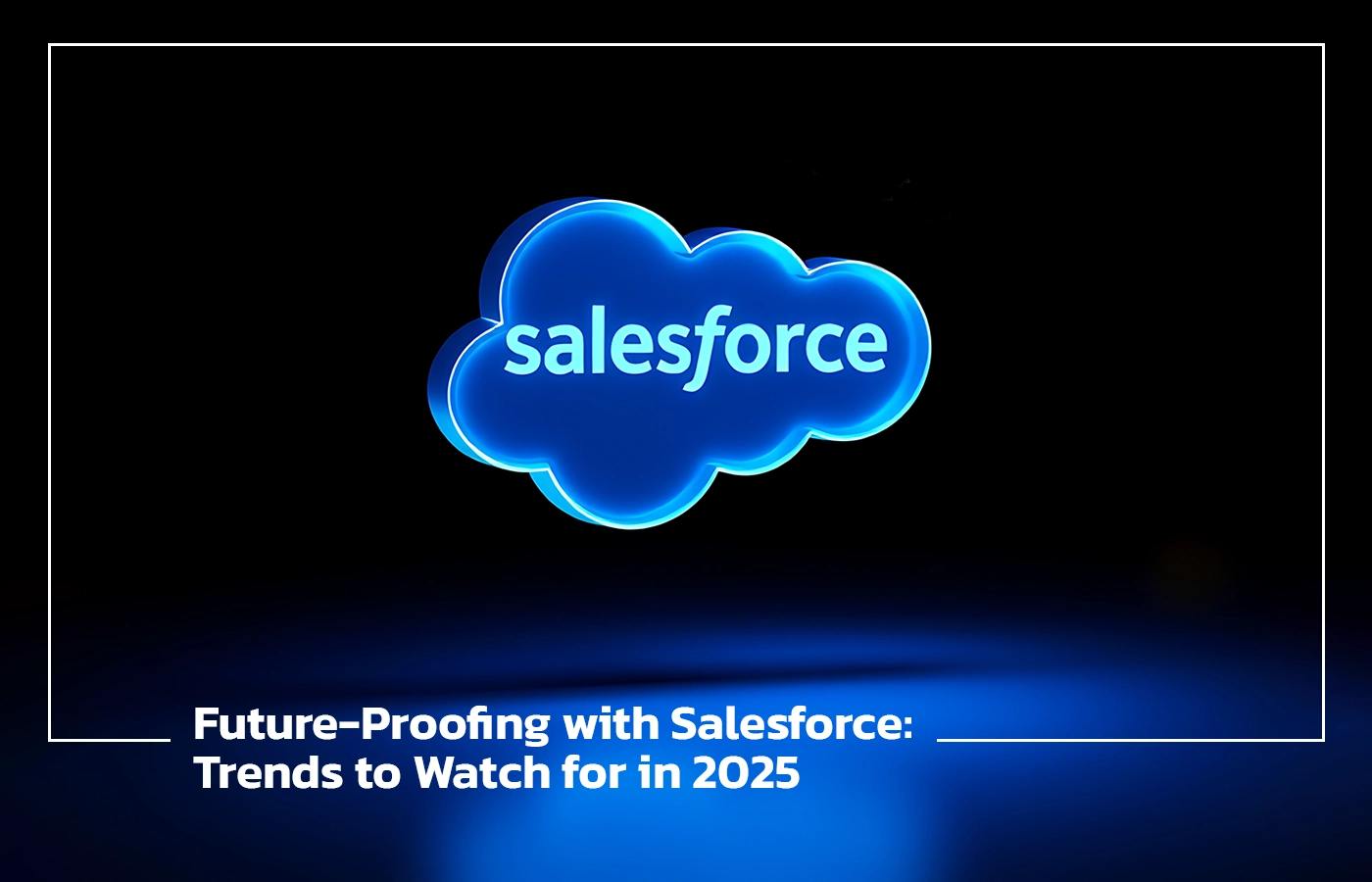Future-Proofing with Salesforce: Trends to Watch for in 2025

Introduction
As businesses continue to embrace digital transformation, Salesforce remains at the forefront, offering cutting-edge solutions to meet the evolving demands of modern enterprises. The blog provides a comprehensive look into the technical roadmap of Salesforce, highlighting how businesses are using its ecosystem to drive value and innovate in new ways. We discuss the importance of data, AI-driven differentiation, and ecosystem orchestration.
We’ve referred to Salesforce’s technology roadmap to give you a glimpse of what lies ahead for businesses leveraging Salesforce in 2025 and beyond.
1. Data as a Dominant Force:
Data remains the lifeblood of effective business strategy, and Salesforce has recognized the importance of making data central to all operations. With the proliferation of digital channels, companies collect massive amounts of data on their customers, products, and internal processes. However, the ability to derive insights from that data is what drives smarter decision-making.
Unified Data with Salesforce Data Cloud – Salesforce’s Data Cloud enables organizations to consolidate customer data from multiple touchpoints into a single repository, enhancing customer relationship management (CRM). The data unification also provides actionable insights leading to personalized and efficient customer interaction.
Data Privacy and Compliance – As data privacy regulations tighten worldwide, compliance becomes a strategic priority. Salesforce’s technology roadmap shows a continued commitment to building privacy and compliance into every level of its data architecture, from user data security to AI ethics. Companies can expect more tools in 2025 to address evolving regulatory requirements that enhance trust and transparency with their customers.
2. AI-Driven Differentiation:
Artificial intelligence (AI) has transformed from a buzzword into a core component of business innovation, and Salesforce is harnessing AI to drive differentiation for its customers. The transformative power of AI enhances CRM capabilities, making it easier for organizations to analyze customer behaviour, predict trends, and deliver hyper-personalized experiences.
Einstein AI and Beyond – Einstein AI, the AI suite of Salesforce, has been at the forefront of these advancements, providing users with predictive analytics, automated recommendations, and dynamic insights.
Einstein’s expanding capabilities include predictive analytics and deeper insights into customer intent and preferences. As the Salesforce technology roadmap outlines, Einstein AI will integrate more advanced natural language processing (NLP) and machine learning (ML) algorithms in 2025, allowing for a deeper understanding of customer sentiment and behaviour.
Generative AI for CRM – Generative AI, mainly through Salesforce’s recent innovations, enables new ways of customer engagement by automating content generation, personalizing recommendations, and reducing response times. According to Salesforce’s roadmap, generative AI will continue to evolve, helping businesses create meaningful connections with customers while optimizing resources. It is particularly beneficial for companies managing large-scale customer service operations, where quick, personalized responses are crucial.
AI Governance and Ethical AI – As AI becomes an integral part of the CRM ecosystem, Salesforce focuses on ethical AI development, including building transparency and bias mitigation into its AI models. As the demand from customers increases for AI systems that are fair and trustworthy, and the commitment to ethical AI positions it well in the CRM landscape.
3. Ecosystem Orchestration:
The third insight revolves around ecosystem orchestration, a concept that describes the interconnectedness of various tools and applications within the Salesforce ecosystem. For modern enterprises, leveraging Salesforce is no longer about using a single platform but about orchestrating an entire suite of interconnected applications that work seamlessly to deliver a cohesive customer experience.
Salesforce AppExchange and Integration Capabilities – One of Salesforce’s strengths has always been its vast marketplace of applications on the AppExchange. It is evident that the future of CRM lies in how businesses can integrate various tools and applications to create custom solutions tailored to their unique needs. AppExchange’s ecosystem of solutions allows companies to expand Salesforce’s capabilities across industry-specific tools, finance applications, human resource management, and beyond.
Flow Orchestration for Process Automation – Salesforce’s technology roadmap highlights Flow Orchestration, which is set to streamline complex workflows and boost productivity. By integrating Flow Orchestration, companies can automate intricate, multi-step processes across departments, ensuring that all departments of an organization are aligned and data flows seamlessly across all touchpoints.
Enhanced Industry Solutions – The technology roadmap of Salesforce also indicates that they focus on industry-specific solutions to help companies tailor their CRM strategies more effectively. Industry Cloud solutions for sectors like healthcare, finance, and manufacturing provide specialized tools and applications, enabling companies to address their specific challenges and comply with industry regulations.
Looking Ahead at 2025
The Salesforce tech roadmap emphasizes the importance of data, AI, and ecosystem orchestration in driving business success. With a focus on expanding AI capabilities, data unification, and industry-specific tools, Salesforce equipps businesses to navigate the challenges of the rapidly evolving digital landscape.
Businesses adopting these trends can expect improved customer engagement, streamlined operations, and a stronger competitive position. By focusing on data-driven insights, AI-driven differentiation, and a connected ecosystem, Salesforce is set to redefine the CRM platform.
Companies aiming to leverage a CTM system in the coming years would benefit from aligning their strategy with these insights, ensuring they stay ahead of the curve in a fast-paced market.
Partner with PSAG Technologies, a leading Salesforce Consulting Partner in Australia to learn more about Salesforce solutions.
